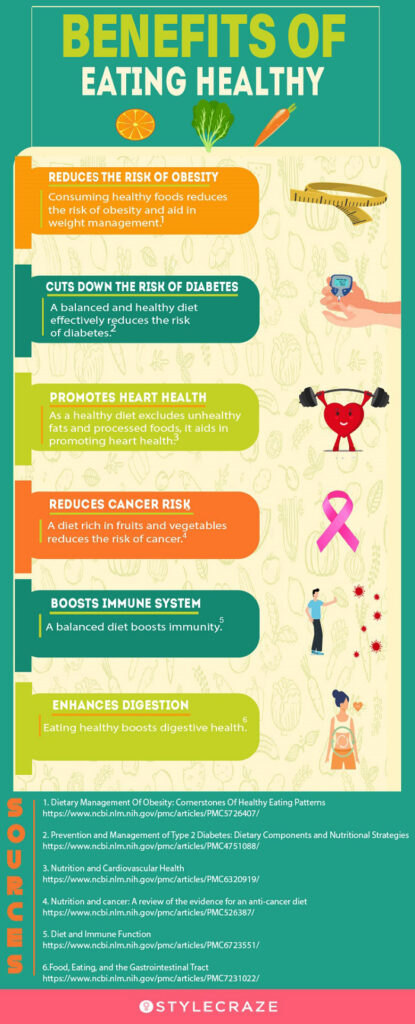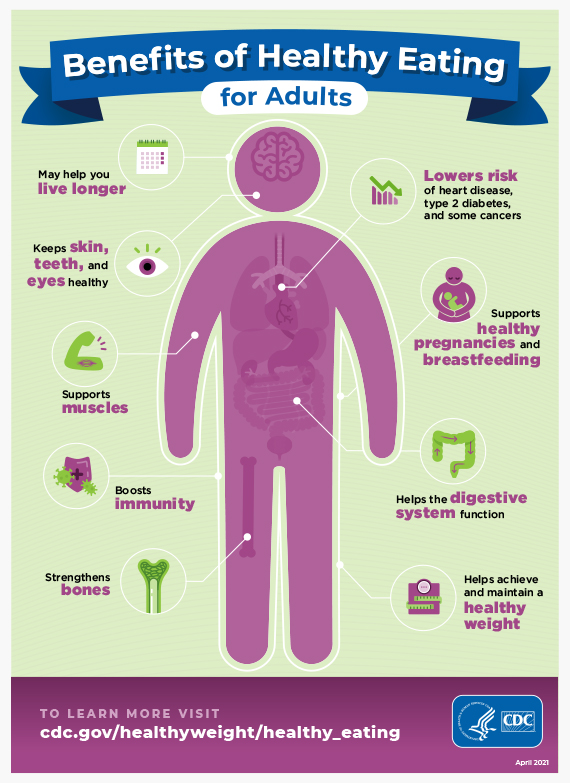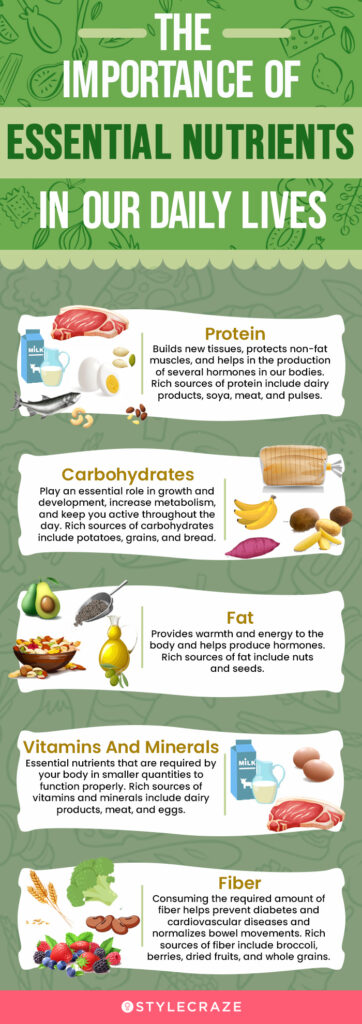I have always been fascinated by the incredible benefits that come with incorporating healthy eating into our lives. From improved energy levels to a strengthened immune system, the positive impact it has on our overall well-being is truly remarkable. Not only does healthy eating contribute to healthier weight management, but it also promotes better mental clarity and emotional stability. In this article, I will explore some of the amazing advantages that come with adopting a nutritious diet and provide practical tips for incorporating healthy eating habits into our daily lives. Get ready to embark on a journey towards a healthier and happier version of yourself!

The Incredible Benefits of Incorporating Healthy Eating in Your Life
As a firm believer in the power of healthy eating, I want to share with you the incredible benefits that come with making nutritious food choices. By incorporating healthy eating into your daily routine, you can improve your physical health, enhance your mental well-being, maintain a healthy weight, increase longevity, promote heart health, strengthen bones and teeth, boost digestive health, support skin health, improve sleep quality, and strengthen your immune system. With these benefits in mind, let’s explore each area in more detail.
Improves Physical Health
Increases Energy Levels
One of the first noticeable benefits of healthy eating is an increase in energy levels. By fueling your body with nutrient-rich foods, you provide it with the necessary fuel it needs to function optimally. A well-balanced diet consisting of fruits, vegetables, whole grains, lean proteins, and healthy fats helps regulate blood sugar levels, ensuring a steady supply of energy throughout the day. With more energy, you’ll be able to tackle daily tasks with gusto and enthusiasm.
Boosts Immune System
A strong immune system is crucial for fighting off infections and illnesses. By incorporating healthy eating habits into your life, you can boost your immune system and reduce your risk of falling ill. Nutrient-rich foods, such as fruits and vegetables, are packed with vitamins, minerals, and antioxidants that strengthen your immune system. These nutrients help protect your body against harmful pathogens and boost the production of disease-fighting cells.
Reduces Risk of Chronic Diseases
Another significant benefit of healthy eating is a reduced risk of chronic diseases. By consuming a diet rich in fruits, vegetables, whole grains, and lean proteins, you provide your body with the necessary nutrients to ward off diseases like diabetes, heart disease, and certain cancers. Additionally, healthy eating can help maintain steady blood pressure and cholesterol levels, reducing the risk of cardiovascular diseases.

Enhances Mental Well-being
Improves Mood and Mental Clarity
Healthy eating not only has physical benefits but also plays a vital role in enhancing your mental well-being. Research has shown that a nutrient-rich diet can improve your mood and mental clarity. Foods rich in omega-3 fatty acids, such as fatty fish, walnuts, and flaxseeds, have been linked to reduced symptoms of depression and anxiety. By nourishing your brain with the right nutrients, you can experience improved focus, concentration, and emotional well-being.
Reduces Symptoms of Depression and Anxiety
Depression and anxiety are common mental health disorders that can greatly impact an individual’s quality of life. The good news is that healthy eating can help alleviate some of these symptoms. Foods high in antioxidants, such as berries and dark chocolate, have been linked to reducing inflammation and oxidative stress in the brain, which can contribute to improved mood and reduced symptoms of depression and anxiety. Incorporating these foods into your diet can support your mental well-being and contribute to a happier, more balanced life.
Enhances Cognitive Function
Maintaining optimal cognitive function is essential for both young and old alike. Healthy eating can enhance cognitive function and protect against age-related decline in brain health. Certain foods, such as blueberries, leafy greens, and fatty fish, are rich in antioxidants and omega-3 fatty acids, known for their brain-boosting properties. These nutrients support brain health, improve memory, and enhance overall cognitive function.
Maintains Healthy Weight
Provides Essential Nutrients while Controlling Calories
Maintaining a healthy weight is crucial for overall well-being. Healthy eating helps you achieve this by providing essential nutrients while controlling calorie intake. By choosing nutrient-dense foods over calorie-dense ones, you can nourish your body with the necessary vitamins, minerals, and antioxidants while keeping your calorie consumption in check. This approach ensures you get the most bang for your buck from the foods you eat and helps you maintain a healthy weight.
Promotes Satiety and Reduces Cravings
One of the challenges of maintaining a healthy weight is managing cravings and feelings of hunger. By incorporating healthy eating habits, you can promote satiety and reduce cravings, making it easier to resist unhealthy food choices. Foods high in fiber, such as whole grains, fruits, and vegetables, keep you feeling full for longer periods, reducing the urge to snack on unhealthy options. Additionally, including lean proteins and healthy fats in your meals can help stabilize blood sugar levels, preventing spikes and crashes that can lead to cravings.
Aids in Effective Weight Management
Achieving and maintaining a healthy weight is not just about calorie counting but also about nourishing your body with the right foods. Healthy eating aids in effective weight management by providing your body with the nutrients it needs to function optimally. By focusing on whole, unprocessed foods and avoiding sugary drinks and processed snacks, you can create a sustainable eating pattern that supports long-term weight management.

Increases Longevity
Reduces Risk of Premature Aging
Nobody wants to age prematurely, and healthy eating can play a significant role in reducing the signs of aging. A diet rich in antioxidants, such as fruits, vegetables, and nuts, helps protect your body against free radicals and oxidative stress, which can contribute to premature aging. By nourishing your body with the right nutrients, you can maintain a youthful appearance and feel vibrant from the inside out.
Enhances Life Span and Quality of Life
In addition to reducing the risk of premature aging, healthy eating can enhance your life span and overall quality of life. Studies have shown that individuals who follow a balanced diet have a lower risk of chronic diseases, which can extend their life span significantly. Furthermore, a well-nourished body is more resilient and better equipped to handle the challenges that come with aging, allowing you to maintain an active, fulfilling lifestyle.
Improves Overall Well-being
The overall well-being of an individual encompasses various aspects of physical, mental, and emotional health. Healthy eating contributes to your overall well-being by providing your body with the necessary nutrients to thrive. When your body is well-nourished, you are more likely to experience increased energy levels, improved mood, enhanced cognitive function, and better overall health. By making healthy eating a priority, you are investing in your overall well-being and setting yourself up for a vibrant and fulfilling life.
Promotes Heart Health
Lowers Cholesterol Levels
Heart disease is a leading cause of death globally, but healthy eating can significantly reduce the risk of developing this condition. By adopting a heart-healthy diet, you can lower cholesterol levels and maintain healthy blood pressure. Foods rich in fiber, such as oats, legumes, and fruits, help reduce bad cholesterol (LDL) levels, leading to a healthier heart. Additionally, sources of healthy fats, like olive oil, nuts, and avocados, can help maintain healthy cholesterol levels and reduce the risk of heart disease.
Reduces Blood Pressure
High blood pressure, also known as hypertension, is a major risk factor for heart disease. Healthy eating can help regulate blood pressure levels and reduce the risk of hypertension. A diet low in sodium and high in potassium, such as the DASH (Dietary Approaches to Stop Hypertension) diet, has been proven effective in reducing blood pressure. Including foods like fruits, vegetables, whole grains, and lean proteins can help maintain healthy blood pressure levels and promote a healthy heart.
Prevents Cardiovascular Diseases
The heart is a vital organ that requires proper care and nourishment. Healthy eating plays a crucial role in preventing cardiovascular diseases, such as heart attacks and strokes. By adopting a diet low in saturated and trans fats and high in fiber and antioxidants, you can reduce your risk of developing these life-threatening conditions. Choosing whole, unprocessed foods over processed snacks and sugary drinks helps protect your heart and keep it healthy for years to come.

Strengthens Bones and Teeth
Increases Calcium and Vitamin D Intake
Maintaining strong bones and teeth is essential for overall health and quality of life. Healthy eating can contribute to this by increasing your calcium and vitamin D intake. Calcium is crucial for bone health, and foods like dairy products, leafy greens, and fortified plant-based milk alternatives are excellent sources. Vitamin D is essential for optimal calcium absorption, and spending time outdoors and including foods like fatty fish and fortified foods can help meet your daily requirements.
Promotes Strong Bone Density
Healthy eating promotes strong bone density, reducing the risk of conditions like osteoporosis. By consuming adequate calcium, vitamin D, and magnesium, you provide your body with the necessary building blocks for strong bones. Including dairy products, leafy greens, nuts, and seeds in your diet can support bone health and reduce the risk of fractures and bone-related disorders.
Reduces Risk of Osteoporosis
Osteoporosis is a condition characterized by weak and brittle bones, often resulting in fractures and limited mobility. Healthy eating can reduce the risk of osteoporosis by prioritizing bone-healthy foods. In addition to calcium and vitamin D, other nutrients like vitamin K, phosphorus, and protein play vital roles in maintaining bone health. A well-rounded diet that includes a variety of fruits, vegetables, whole grains, lean proteins, and healthy fats can reduce the risk of osteoporosis and contribute to strong and healthy bones.
Boosts Digestive Health
Aids in Regular Bowel Movements
Digestive health plays a crucial role in overall well-being, and healthy eating can support optimal digestive function. A diet rich in fiber promotes regular bowel movements, preventing constipation and promoting a healthy digestive system. Fruits, vegetables, whole grains, legumes, and nuts are excellent sources of dietary fiber that can keep your digestive system running smoothly.
Enhances Nutrient Absorption
Even if you consume a nutrient-rich diet, your body may not be able to absorb all the essential vitamins and minerals. Healthy eating can enhance nutrient absorption by including foods rich in fiber, healthy fats, and certain vitamins. For example, pairing vitamin C-rich foods with iron-rich foods can boost iron absorption. By optimizing nutrient absorption, you ensure that your body receives the maximum benefit from the foods you consume.
Reduces Risk of Digestive Disorders
Digestive disorders, such as irritable bowel syndrome (IBS) and inflammatory bowel disease (IBD), can greatly impact an individual’s quality of life. Healthy eating can reduce the risk of developing these conditions. A diet rich in fruits, vegetables, whole grains, and probiotic-rich foods such as yogurt and fermented foods can promote a healthy gut microbiome, reducing the risk of digestive disorders and improving overall digestive health.

Supports Skin Health
Provides Essential Nutrients for Radiant Skin
They say beauty comes from within, and healthy eating can have a significant impact on the health and appearance of your skin. By providing your body with essential nutrients, such as vitamins A, C, and E, and antioxidants, you promote radiant, youthful-looking skin. Foods like berries, citrus fruits, leafy greens, and nuts are packed with these skin-loving nutrients, supporting overall skin health.
Reduces Acne and Skin Issues
Acne and skin issues are common concerns that can affect individuals of all ages. Healthy eating can play a role in reducing the occurrence and severity of these issues. Diets high in processed foods, sugar, and unhealthy fats have been associated with increased inflammation in the body, which can contribute to skin problems. By prioritizing whole, unprocessed foods and minimizing the consumption of sugary snacks and processed snacks, you can support clear, healthy-looking skin.
Delays Skin Aging
Nobody wants to see signs of aging prematurely, and healthy eating can slow down the aging process and keep your skin looking youthful. A diet rich in antioxidants, vitamins, minerals, and healthy fats can protect your skin against free radicals and oxidative stress, which contribute to the aging process. By nourishing your body with the right nutrients, you can help delay the appearance of wrinkles, fine lines, and other signs of aging.
Improves Sleep Quality
Regulates Sleep-wake Cycle
A good night’s sleep is essential for overall health and well-being, and healthy eating can contribute to improved sleep quality. Certain foods, such as turkey, nuts, seeds, and kiwi, contain sleep-enhancing nutrients like tryptophan, magnesium, and melatonin. By incorporating these foods into your evening meals or snacks, you can help regulate your sleep-wake cycle and promote better sleep.
Promotes Deep and Restful Sleep
Healthy eating can promote deep and restful sleep, allowing you to wake up feeling refreshed and rejuvenated. Avoiding heavy meals, caffeine, and sugary snacks close to bedtime can help prevent sleep disruptions. Instead, opt for light, balanced meals that include complex carbohydrates, lean proteins, and healthy fats, which can help induce a state of relaxation and promote a good night’s sleep.
Controls Insomnia Symptoms
Insomnia, characterized by difficulty falling asleep or staying asleep, can greatly impact an individual’s quality of life. Healthy eating can play a role in controlling insomnia symptoms and promoting better sleep. Foods like cherries, walnuts, bananas, and whole grains contain nutrients like melatonin and magnesium, which have been shown to improve sleep quality and reduce insomnia symptoms. By incorporating these foods into your diet, you can support better sleep and enhance your overall well-being.
Strengthens the Immune System
Provides Nutrients Essential for Immune Function
A robust immune system is crucial for staying healthy and fighting off infections and illnesses. Healthy eating provides essential nutrients necessary for optimal immune function. Foods rich in vitamin C, such as citrus fruits, bell peppers, and broccoli, support the production of immune-boosting cells. Zinc, found in foods like seafood, lean meats, and legumes, also plays a vital role in immune function. By including a variety of nutrient-dense foods in your diet, you can strengthen your immune system and reduce your risk of getting sick.
Enhances Resistance to Infections and Illnesses
Supporting your immune system through healthy eating enhances your body’s resistance to infections and illnesses. By providing your body with the necessary nutrients, vitamins, and minerals, you equip it with the tools it needs to fight off potential invaders. A well-nourished body is better equipped to produce disease-fighting cells and mount a strong immune response when exposed to pathogens.
Reduces Severity and Duration of Cold and Flu Symptoms
When the inevitable cold or flu strikes, healthy eating can help reduce the severity and duration of symptoms. Foods rich in antioxidants, such as berries, leafy greens, and garlic, help strengthen the immune system and reduce inflammation, making it easier for your body to recover. Additionally, staying hydrated and consuming warm liquids like herbal teas can soothe a sore throat and alleviate congestion, promoting faster recovery.
Incorporating healthy eating into your life offers a wealth of benefits for your physical and mental well-being. From increased energy levels and a stronger immune system to healthier skin and improved sleep quality, the advantages are undeniable. By making conscious choices to nourish your body with nutrient-rich foods, you empower yourself to live a vibrant, fulfilling life. So, why wait? Start embracing healthy eating today and experience the incredible benefits for yourself.


